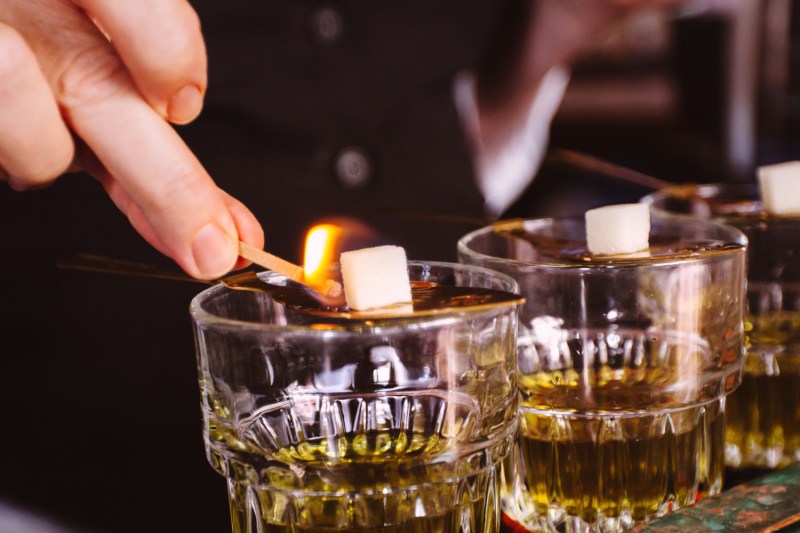Artificial intelligence is doing more than you think. From autonomous vehicles and streaming services to social media, AI has left its thumbprint on quite a bit. The robots are now coming for your cocktails, and that may not be a bad thing.

Consider the cocktail above: the Heavenly Sipper, devised by ChatGPT. The popular AI chatbot, used for tasks like more articulate text messages and last-minute essays (not advised), was recently called into action to make the ideal cocktail.
The result is an admittedly delicious-sounding cocktail. The Heavenly Sipper, while guilty of having a robotic name, is a complex mixed drink. Combining gin, Absinthe, Cointreau, elderflower liqueur, lime juice, honey syrup,
Katie Renshaw is the brand ambassador for St-Germain. She’s worked at a number of acclaimed Chicago watering holes over the years, such as Billy Sunday and Moneygun. Her work in creating the Heavenly Sipper was her first collab with AI, but she sees a lot of potential. AI came up with the recipe, and a real human, Renshaw, tested the drink out and fine-tuned the volumes of each ingredient.
“I think AI could help inspire modern classics by giving us ratios and recipes we’ve never even considered as bartenders,” Renshaw says. “By having such a breadth of empirical knowledge, AI could learn to predict balance in a whole new way.”
It’s important to consider the many things that go into a perfectly-balanced drink. You have to get the volumes right, sure, but it’s also about texture and even things on a molecular level. “AI can understand density, ABV, and brix [sugar density] of spirits, as well as a plethora of traditional flavor pairings, in a single instance, so it has the potential to create cocktails that are perfectly balanced, without being bound to classic cocktail proportions,” Renshaw says.
For a brand ambassador, that could spell exciting new recipes for the elderflower liqueur.”By having endless access to information about more modern spirits too, it would have the ability to incorporate something like St-Germain into classic and original cocktails with precision, keeping in mind its sweet but bright fresh flavor profile,” she says. “There are a lot of interesting ways to use the technology, but I believe we’ll always need someone on the other end to taste!”
Other AI bartending assists

Renshaw believes there’s an education and connectivity element that AI could really offer the bartending world too. “I think with the proper prompts, AI could assist in creating training manuals and handbooks for bars and bartenders by learning from data from the best cocktail bars and bartenders around the world,” she says. “With the right information, AI could even create guides on hospitality itself, helping us learn how to anticipate a guest’s needs in even more profound ways.”
That’s a pretty mind-blowing thought: Using AI to essentially predict the future and detect a patron’s next move before it even happens. One could argue that the best bartenders and hospitality folks already have this gift but anything involving a jump in the space and time continuum has our attention.
“AI also is already playing a role for bars’ promotional efforts, generating everything from text content for social media posts to happy hour ideas and special event concepts,” Renshaw says. “With all of that, the human element of bartending is absolutely necessary — the connection between a bartender or hospitality the guest cannot be recreated by tech.”
There are more out there AI bartending ideas being put to work at the moment. Take Cecilia, the AI bartender created over the course of three years in Israel. The synthetic barkeep boasts voice recognition skills, dialed-in-cocktail creation, contactless ordering, and even the banter that bartenders know oh so well.
Or, there’s Yanu, a fully autonomous bartending unit. The bar, which comes in three different colors, can whip up 100 cocktails per hour, take orders via an app, and be maintained in the Cloud. Yanu sounds far-fetched, pulled from a scene in Minority Report, but it’s here and more units are likely to follow.
AI will almost certainly affect bartenders less directly, at least early on, but we’re really just beginning to see what the capabilities might be. Bartenders should not fear for their jobs just yet, but
Where AI is lacking

“While I haven’t spent much time with AI tools yet, I can imagine there would be a learning curve as AI evaluates newer spirits and catches up with new cocktail techniques and trends,” Renshaw says. Then there’s the time of year, which influences that cocktail realm as much these days as it does the culinary world. “AI also can’t taste ingredients that may be seasonal or may change over time. They also can’t predict cocktail trends; time has shown us that trending and viral cocktails don’t follow any sort of pattern or predictability, and that’s what keeps our world exciting!”
The robots may not be taking over the bar but they’re certainly creating an impact. The real balancing act going forward may just be locating the sweet spot between AI-generated content and genuine human-directed hospitality and execution. Restaurants are using robots and there are already some airport AI bartenders out there.
Will AI change the way we view a perfect Old Fashioned or a Tom Collins cocktail? That story is being written as we speak.


